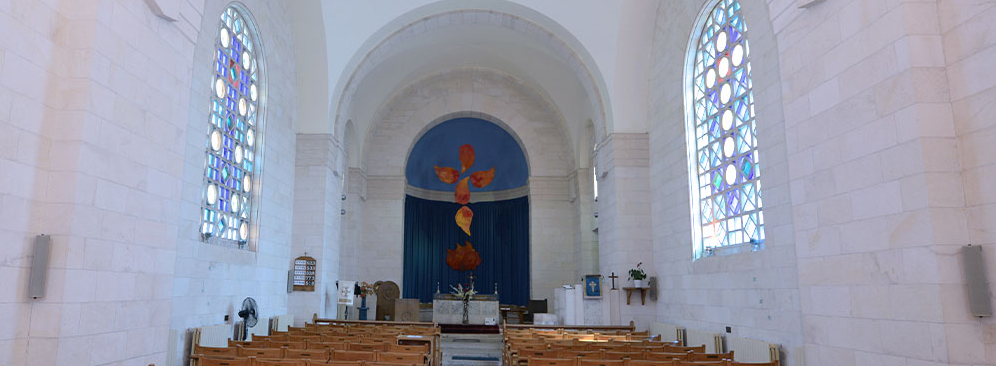Sixteenth Sunday after Pentecost, September 4 2016
Jeremiah 18.1-11; Philemon 1-21; Luke 14.25-33
St Andrew’s Scots Memorial Church, Jerusalem
To be human is to change, said John Henry Newman, and to be perfect is to have changed often.
He forgot to add that change is hard, and radical change excruciatingly painful.
To change my deepest intellectual convictions, my most profound ethical beliefs, or my long-standing religious commitments challenges me at my root.
*
Alice Su is a Princeton graduate and a Chinese-American evangelical. Two years ago, she posted an open letter on the +972 blog, in which she wrote about an Omani Muslim who became a Christian.
Afterwards, he cried for two weeks. It felt like he had ripped off his own skin.
She also wrote about an Israeli student friend who had changed his thinking after a gap year in Tibet.
“The Tibetans live there with their language, religion and culture. It’s all Tibetan,” he told her, his face wrenched, his words slow. “But the people in control are all Chinese. Another race is in charge.”
“I thought that was so wrong.”
Then he added that he felt upset, because it reminded him of what we have here.
It’s an uncomfortable thought, if the whole of your life you’ve thought that what we have here is who you are.
Living with that discomfort is part of what Jesus means when he caps our uncomfortable Gospel reading by saying that we cannot be his disciples, his pupils, if we do not give up all our possessions. It is perhaps the key part.
Far more precious to us than our iPhones is our identity, our understanding of who we are, how the world is, how we should live in it, and who or what we should worship. Challenge that, and you rip off our skin.
*
When Vivien and I were on holiday in Switzerland last month, we visited Ballenberg. This open-air museum in the canton of Berne displays traditional rural buildings from all parts of Switzerland. It painstakingly dismantles these historical edifices and reassembles them on its grounds for anyone to visit.
Ballenberg itself is not a good metaphor for radical change. It takes these rural buildings apart piece by piece and then puts them back together exactly as they were. When we change radically, we are never the same again.
But during our visit to the museum, in a small 19th-century farmhouse from Unterseen, we saw Kaspar Würgler working the clay on his potter’s wheel.
On his wheel, he makes cups, bowls, milk jugs, coffee pots, and platters for Rösti – not quite what Jeremiah saw.

Würgler is an experienced potter, and none of the pieces he threw while we were watching needed to be remade. As the wheel turned and his fingers shaped and moulded, the clay was completely under his control.
It isn’t always like that. Perhaps the potter’s clay is not of the right consistency. Perhaps the shape that emerges under his hands is not quite to his liking. And so the potter starts over.
*
This is what God does with us, shaping and moulding our lives. This, indeed, is how the second creation story in Genesis depicts God as making us: “Then the Lord God formed man from the dust of the ground, and breathed into his nostrils the breath of life; and the man became a living being.”
As God’s hands knead and smooth the moist clay, God breathes life into God’s new creation.
The trouble is, as living beings, we can go our own way. We can resist God. We can refuse to be shaped as God would shape us.
A person or a people, an individual or a nation, a kingdom or a state: We can choose to do evil – but then we are choosing death.
The alternative Old Testament reading for this Sunday is the famous passage from Deuteronomy 30 where Moses speaks to the people of Israel on the east bank of the Jordan and puts before them life and prosperity, death and adversity.
In the text, this speech is set at the end of the wilderness period in Israel’s journey from slavery in Egypt to the land of promise. In real life, it may well have been addressed to that part of the people of Judah that had been driven into exile in Babylon many centuries later, at the time of Jeremiah.
In both settings – indeed at every major turning point in the life of the people – the purpose of the text is to assure them of God’s care but also to remind them that how they respond to God will shape their future for good or ill.
And the point, of course, generalizes. Jeremiah in our reading speaks specifically to his own people, the people of Judah. But he speaks also of any nation or kingdom – of England and Ireland, Switzerland and the United States and the nations of the far east, even (though it may be hard to believe) of Scotland.
Behold, says Moses, I put before you this day life and death. Choose life that you may live. This also is what Jeremiah says: “Turn now, all of you from your evil way, and amend your ways and your doings.”
But the people will not listen. “It is no use!” they say. “We will follow our own plans, and each of us will act according to the stubbornness of our evil will.”
Or the stupidity of our darkened minds.
*
Alistair Crooke was a British spy. Perhaps he still is. Today, he heads an organization in Beirut called Conflicts Forum.
In 2009, he published a book called Resistance: The Essence of the Islamist Revolution, in which he argues that Islamist movements may have a point in their criticisms of the liberal, enlightened west.
I mention his book this morning not to agree with him – that would need a longer discussion – but because it contains this striking sentence:
Societies, says Crooke, “can become prisoners to their own history – until grave misfortune leaves them no option but to re-imagine themselves afresh.”
*
In 1896, Theodor Herzl published The Jewish State, in which he argued that the gentile world would always hate the Jews in its midst and that Jews, therefore, had no other choice but to create a state of their own. In 19th-century Austria, it was a plausible argument. In 20th-century Germany, it became even more convincing.
The following year, Herzl convened the first Zionist Congress; and half a century later, the modern state of Israel was created on the foundations of Herzl’s political Zionism: a Jewish state for a Jewish people with a built-in Jewish majority.
One of the most fascinating things about my first two years here – I arrived in Jerusalem at the beginning of September 2014 – has been to watch Israeli commentators twisting in the wind as they struggle with the realization that today Herzl’s project has reached a dead end.
There is no solution to the Israeli-Palestinian conflict – certainly no just solution – that does not call in question Herzl’s fundamental assumptions. Without challenging the framework of his political Zionism, neither a two-state solution nor a one-state solution will do.
Happily, a few brave Jewish Israeli souls are beginning to think outside the box. But this is an incredibly difficult and painful thing to do. It requires us to call in question our most cherished beliefs. Indeed, as Crooke suggests in the sentence I quoted, it is only when we recognize that we have reached a dead end that we can bring ourselves to make the effort.
This is an effort that all of us need to make – Arabs and Jews, Palestinians and Israelis, and those of us who are here as more than interested observers.
At its heart is the rejection of Us and Them thinking.
*
Earlier in Luke’s Gospel, Jesus says “Love your enemies, do good to those who hate you, bless those who curse you, pray for those who abuse you. … If you love those who love you, what credit is that to you? For even sinners love those who love them. But love your enemies… Your reward will be great, and you will be children of the Most High; for he is kind to the ungrateful and the wicked. Be merciful, just as your Father is merciful.”
This is not just about how we are to behave as individuals in our private lives, although it certainly is about how we are to live together as a congregation.
The teachings of Jesus in Luke’s sermon on the plain, like those in Matthew’s sermon on the mount, are addressed not just to his disciples but to the whole people of Israel. They are about the kind of community Israel is to be and, by implication, the kind of community the church is to be, and all communities are to be.
And they go to the root of who we are.
If we are to be helpful in the situation in which we are living here, says Alice Su, we need to be smart, we need to be brave, but above all we need simply to be human.
The situation here offers us a chance to rediscover a passion for justice that walks hand in hand with empathy for everyone, without preferring one group over another.
The situation here offers us a chance to rediscover what it means to be Christian.
Hymns
Great God of every shining constellation that shine in splendour through the midnight sky (CH4 246)
Lord, teach me all your ways, reveal your paths to me (CH4 21: Psalm 25)
Touch the earth lightly, use the earth gently (CH4 243)
For your generous providing which sustains us all our days (CH4 655)
I, the Lord of sea and sky, I have heard my people’s cry (CH4 251)
Sources
Ballenberg, “Crockery for everyday use from the village pottery workshop”
Conflicts Forum
Alastair Crooke, Resistance: The Essence of the Islamist Revolution (London: Pluto, 2009)
Robert Davidson, Jeremiah vol 1 (The Daily Study Bible, Edinburgh: The St Andrew Press, 1983)
Bernard Lonergan, Method in Theology (London: Darton, Longman & Todd, 1972)
Alice Su, An open letter to Evangelical supporters of Israel, +972 Blog, March 19 2014
Wikipedia, Ballenberg
Working Preacher

